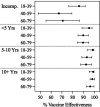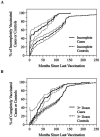Retrospective, matched case-control analysis of tickborne encephalitis vaccine effectiveness by booster interval, Switzerland 2006-2020
- PMID: 35459683
- PMCID: PMC9036433
- DOI: 10.1136/bmjopen-2022-061228
Retrospective, matched case-control analysis of tickborne encephalitis vaccine effectiveness by booster interval, Switzerland 2006-2020
Abstract
Objective: To estimate effectiveness of tickborne encephalitis (TBE) vaccination by time interval (<5, 5-10 and 10+years) postvaccination.
Design: A retrospective, matched case-control study PARTICIPANTS: Cases-all adult (age 18-79) TBE cases in Switzerland reported via the national mandatory disease reporting surveillance system from 2006 to 2020 (final n=1868). Controls-community controls from a database of randomly selected adults (age 18-79) participating in a 2018 cross-sectional study of TBE vaccination in Switzerland (final n=4625).
Primary outcome measures: For cases and controls, the number of TBE vaccine doses received and the time since last vaccination were determined. Individuals were classified as being 'unvaccinated' (0 doses), 'incomplete' (1-2 doses) or 'complete' (3+ doses). Individuals with 'complete' vaccination were further classified by time since the last dose was received (<5 years, 5-10 years or 10+ years). A conditional logistic regression model was used to calculate vaccine effectiveness (VE: 100 × [1-OR]) for each vaccination status category.
Results: VE for incomplete vaccination was 76.8% (95% CI 69.0% to 82.6%). For complete vaccination, overall VE was 95.0% (95% CI 93.5% to 96.1%). When the most recent dose was received <5 years prior VE was 91.6% (95% CI 88.4% to 94.0%), 95.2% (95% CI 92.4% to 97.0%) when the most recent dose was received 5-10 years prior, and 98.5% (95% CI 96.8% to 99.2%) when the most recent dose was received 10+ years prior.
Conclusions: That VE does not decrease among completely vaccinated individuals over 10+ years since last vaccination supports the longevity of the protective response following complete TBE vaccination. Our findings support the effectiveness of 10-year TBE booster intervals currently used in Switzerland.
Keywords: Breakthrough Infection; Duration; Prevention; Protection; TBE.
© Author(s) (or their employer(s)) 2022. Re-use permitted under CC BY-NC. No commercial re-use. See rights and permissions. Published by BMJ.
Conflict of interest statement
Competing interests: The authors declare no competing interests.
Figures



References
-
- Swiss Federal Office of Public Health. Zahlen zu Infektionskrankheiten - Zeckenenzephalitis FSME [Numbers for Infectious Illnesses - Tick-borne Encephalitis - TBE]., 2021. Available: https://www.bag.admin.ch/bag/de/home/zahlen-und-statistiken/zahlen-zu-
-
- SEN . Encepur N Fachinfo [Technical Information]: Compendium.ch, 2020. Available: https://compendium.ch/product/105785-encepur-n-inj-susp/mpro
-
- Swissmedic. FSME-Immun® CC Fachinfo [Technical Information]: Compendium.ch., 2020. Available: https://compendium.ch/product/1364944-fsme-immun-cc-inj-susp-sep-nadel/mpro
-
- Swiss Federal Offic of Public Health. Empfehlungen zur Impfung gegen Zeckenenzephalitis [Recommendation for Vaccination against Tick-borne Encephalitis]. 2006. Available: https://www.bag.admin.ch/dam/bag/de/dokumente/nat-gesundheitspolitik/kli...
Publication types
MeSH terms
Substances
LinkOut - more resources
Full Text Sources
